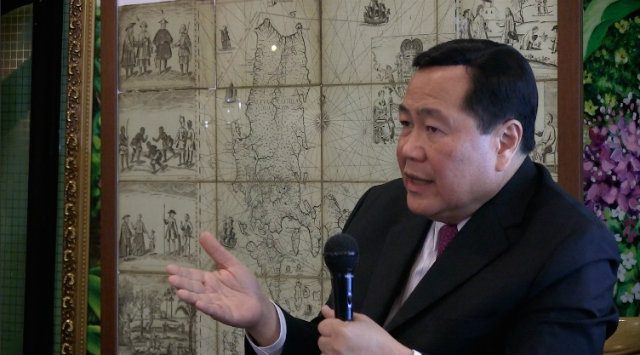SUMMARY
This is AI generated summarization, which may have errors. For context, always refer to the full article.

MANILA, Philippines – Supreme Court (SC) Senior Associate Justice Antonio Carpio criticized President Rodrigo Duterte’s policy on the West Philippine Sea (South China Sea) a year after the Philippines won a case against China over the disputed waters.
In a forum on Wednesday, July 12, Carpio described this aspect of foreign policy as “without discernible direction, coherence, or vision.”
He said he is not blaming the Department of Foreign Affairs (DFA) for this, however, as Duterte is the chief architect of foreign policy.
“The ruling was jubilantly received in Hanoi, but in Manila, the stunning victory became strangely orphaned,” he said on Wednesday, the first anniversary of Manila’s legal victory against Beijing. (READ: PH hails ties with China on year 1 of Hague ruling)
He continued, “The Duterte administration refused to celebrate the ruling, even though the ruling legally secured for the Philippines a vast maritime zone larger than the total land area of the Philippines.”
Carpio made these remarks in a forum organized by the Stratbase-Albert del Rosario Institute on Wednesday, where former top diplomat Del Rosario also spoke and urged the Philippines to “reassume leadership” in resolving the sea dispute.
‘I was aghast’
Speaking after Del Rosario on Wednesday, Carpio pointed out Duterte’s reported statement in December 2016 that “he was setting aside the ruling in favor of better economic relations with China.”
“I was aghast at the President’s use of the phrase ‘setting aside,'” Carpio said.
The justice explained that in law, “to set aside a ruling means to nullify, void, or abandon the ruling.”
He said that he “had to sound the alarm” for the DFA “to immediately clarify the President’s statement.”
He said Duterte’s statement, if accepted by China, “would legally bind the Philippines” as a unilateral declaration by a head of state.
He said that “thankfully,” the DFA promptly clarified “that there was no abandonment of the ruling.” He said the clarification was made “just a few hours before China warmly accepted the President’s statement.”
“This prevented the President’s statement from becoming legally binding on the Philippines, to escape a self-inflicted colossal disaster by the skin of our teeth,” he said.
Carpio continued: “This incident graphically explains Philippine foreign policy on the South China Sea dispute after the arbitral ruling – a policy without discernible direction, coherence, or vision; a policy that relies more on improvisation than on long-term strategy.”
“I do not at all blame the DFA for this because the chief architect of our foreign policy is not the DFA, but the President.” – Rappler.com
Add a comment
How does this make you feel?
There are no comments yet. Add your comment to start the conversation.